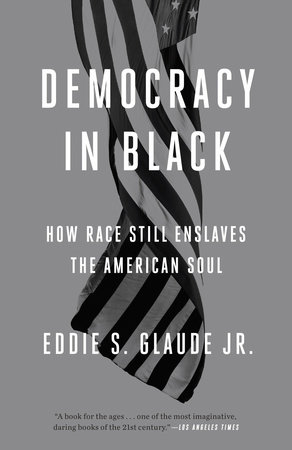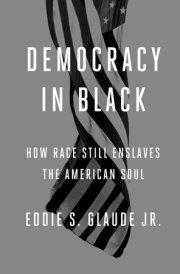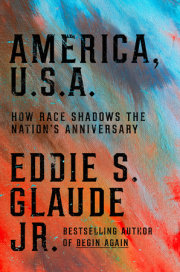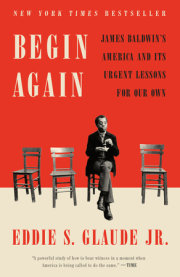Chapter One
The Great Black Depression
Christine Frazer cried softly. She had been through hell and back and the wounds had not healed. Chris had worked hard all her life. She and her late husband had dreamed big dreams for themselves and their family. They had played by the rules. But when Chris lost her home to foreclosure in 2012 everything changed. Now, at the age of sixty-five, she was out of work and forced to live in a senior facility, her cherished home gone, her health deteriorating, and her dreams shattered.
“Me and my husband had a business for twenty-five years,” she said in disbelief. “I raised my daughter in that home. I wasn’t a new homeowner. I had been there for eighteen years.”
Before the eviction, Chris had lived with her eighty-five-year-old mother, her adult daughter, and her four-year-old grandson in a triplex home in a suburb of Atlanta, Georgia. The upstairs had three bedrooms, two baths, and two big living rooms. There were two separate apartments downstairs. The house sat on a large plot of land, with lots of open space where Chris’s dog, Sheeba, could run around. A minister who was a little person had designed the house. “He had been an architect, I guess. And there was not a square room in that house, the way he designed it. That’s why I fell in love with it.” Within a year of moving into their home, her husband lost his legs because of diabetes and had to use a wheelchair. “But here’s the kicker,” Chris said. “Since the house had been built for a dwarf, once the ramp was built, he could maneuver in that house just like anybody else because the switches were lower. It was like God sent us there.”
But when Chris lost her job in 2009 she struggled to keep making the payments. The house was underwater. She had already paid $240,000 on a home now valued at $40,000. Her mortgage changed hands at least three times in six months. Chris tried everything to prevent foreclosure, but the latest holder of her loan--Investors One Corporation--decided to evict her. President Obama had created a plan to help distressed borrowers, but Chris couldn’t take advantage of it; the program required that homeowners be current on their mortgage, and she was not. “But if you’re current on your mortgage, you don’t need modification,” Chris said. The game seemed rigged to protect the mortgage lenders.
Dekalb County sheriffs and deputies arrived in the middle of the night on May 2, 2012, to evict her. “They came in like I was a dope dealer. At three in the morning they drilled a hole in the lock in my front door. They drilled out the lock and just came in my house. It was the most terrifying moment that I can remember in my life. My grandson is six years old, and to this day he does not like police officers, because he remembers. He remembers.”
When the police stormed into the house they ordered Chris and her family to get dressed immediately. Then they proceeded to empty the home of a life’s worth of memories. It was chaos. For seven hours the police piled Chris’s things onto the street. No one could help. The police had cordoned off the area. “They told me to pack up as if I just had a fire at my home and take my immediate possessions. And I had to leave immediately,” she remembered. Everything was scattered, without any care, across the lawn. With no place to go, the family slept in the car--except for the family dog. The police made provisions for Sheeba.
“That was the part that I think came out in the eviction. When they came for me at three in the morning, they didn’t have a place for me and my family to go, but the animal shelter came because they knew that there were dogs there. They came with a place for my dog.”
The sprawling metropolis of Atlanta sat at the epicenter of the housing crisis that shook the foundations of the American economy. Once considered a promised land where good-paying jobs and affordable living offered a real chance for people to fulfill their dreams, by 2012, Atlanta was a wasteland of foreclosed homes and skyrocketing unemployment. In 2007 black unemployment in greater Atlanta was 8.3 percent, but by 2010, that figure had nearly doubled. Chris was among the casualties. According to the Federal Reserve, Atlanta held the dubious distinction of having “the most government-owned foreclosed properties for sale of any large city.” The hard reality was undeniable, and Chris was just one example among many: the housing crisis was devastating black Atlanta, and it hardly stopped there. Like an out-of-control wildfire spreading across dry brushland, the crisis engulfed black America.
It wasn’t supposed to be like this.
The road to the housing crisis in black America was paved with good intentions, sort of. In June of 2002 President George W. Bush made his way to the pulpit of a quaint African Methodist Episcopal church in Atlanta. “Now, we’ve got a problem here in America that we have to address,” he told the crowd.
Too many American families, too many minorities do not own a home. There is a home ownership gap in America. The difference between Anglo American and African American and Hispanic home ownership is too big. And we’ve got to focus the attention of this nation to address this.
Bush had come to St. Paul AME to announce his plans for an “ownership society.” By 2010, he wanted to increase homeownership among minorities by at least 5.5 million. This required making it easier for low-income buyers to make a down payment; it meant that more affordable housing needed to be available in certain neighborhoods and involved streamlining the home-buying process.
Bush hoped to achieve his goal through a vast network of public-private partnerships. He announced that Fannie Mae and Freddie Mac would “increase their commitment to minority markets by more than $440 billion.” Freddie Mac would make it possible for “consumers with poor credit . . . to get a mortgage with an interest rate that automatically goes down after a period of consistent payments”; Fannie Mae would partner with 100 faith-based organizations to improve homeownership education, and organizations like the Enterprise Foundation would help rebuild and rehabilitate urban neighborhoods in partnership with local community groups.
The congregation lavished the president with applause. It was a surreal moment. Here was the president of the United States, the most powerful man in the world--a Republican--stating unequivocally that he was committed to the idea that people of color should own something.
Before delivering the speech, President Bush toured Park Place South, a new development of affordable housing in an area once marked by crime and urban blight. There, he met Darrin West, a black Atlanta police officer who proudly showed off his new home. The president held up West as an example of what was possible with the policies he was promoting. And Bush’s initial efforts to increase homeownership among African Americans were indeed quite successful. The rate of black homeownership rose to 49.1 percent during the height of the housing boom.
But the initiatives President Bush outlined in Atlanta unleashed torrid forces seeking to exploit “emerging markets.” According to the Center for Responsible Lending, African Americans were 150 percent more likely to get a high-cost loan with low interest rates that adjusted upward after two or three years. From 2007 to 2009, the African American homeownership rate fell by 6 percent (to the lowest level since 1995), a drop more than twice that experienced by any other racial group in the United States. African Americans lost more than 240,000 homes
One of them was Darrin West. He couldn’t sell his home, so he gave it back to the bank and simply walked away. The New York Times reported that by 2008, “at least 10 percent of [the] 232 homes” in West’s Park Place South development had been hit with foreclosure. This pattern played itself out across black America, as billions of dollars disappeared from communities already strapped for resources.
The irony is obvious and biting. So many Americans reveled in the historic significance of Barack Obama’s election in 2008. There was a sense of real, exciting possibility, even as the nation confronted the worst economic crisis since the Great Depression. It was a moment of contrasts, of decline but also of possibility--that somehow we were putting the ugliness of our racial past behind us as the country teetered on economic collapse. Uncertainty shadowed national euphoria, and this was especially true for African Americans. Many danced election night away and talked about the fulfillment of the civil rights movement, then woke up to foreclosure notices on their doors.
The foreclosure crisis among African Americans gives a clear sense of the despair and devastation wrought by what can only be called the Great Black Depression. The 2008 recession threatened the economic foundations of the country; over and over again we heard from economists and pundits that the nation had not experienced anything like this since the Great Depression. Venerable financial institutions collapsed. Liquidity froze. Jobs disappeared overnight. The recession cast a dark economic shadow over America.
But in black America, the reality was even bleaker. I mean this beyond the familiar platitude that says “whenever white America has a cold, black America has the flu.” The reality is that by every relevant statistical measure (employment, wages, wealth, etc.) black America has experienced and is experiencing a depression. This is more like the symptoms of a national congenital disease than the flu.
To be sure, the circumstances of black America have waxed and waned since the heyday of the civil rights movement. The black freedom struggle of the 1960s brought unprecedented improvement in the lives of most African Americans. But even with these gains, the gap between whites and blacks persisted through the 1970s and 1980s alongside brewing racial tensions (often because of police violence) and deepening class divisions within black America. Combined with cyclical economic booms and busts, the slow march from the end of Jim Crow to full equality felt more like a bad roller-coaster ride. It was not until the long recovery of the 1990s, spurred by governmental policy and strong economic growth, that we began to see significant economic improvements for black America—particularly for the black middle class.
Fast-forward to the Great Black Depression of 2008. Much of the gains of the 1990s were erased. African Americans lost 31 percent of their wealth between 2007 and 2010. White Americans lost 11 percent. By 2009, 35 percent of African American households had zero or negative net worth. According to the Pew Research Center, by 2011, black families had lost 53 percent of their wealth. Just think about it: an entire decade of economic gains wiped away. Gone. This wasn’t just the loss of homes--the primary source of wealth for most African Americans--but lost retirement savings, which shrank by 35 percent from 2007 to 2010. As many struggled to save their homes, as they witnessed the stock market spiral downward and their pensions dwindle to nothing, they took out what little money they had invested in order to keep themselves afloat. Many could not wait for the market to rebound to reap its benefits. Their children won’t be able to either.
As they lost their homes and saw their savings wiped out, people also lost their jobs, making it hard to imagine ever clawing their way back to where they’d once been. Often the last hired and first fired, people saw black unemployment soar as a result of the economic collapse. So much so that by November 2010, national black unemployment reached the stunning level of 16 percent (and this figure does not include those who simply dropped out of the labor market). White unemployment stood at 9 percent. Some cities, including Detroit and New York, reported unemployment among black males at close to 50 percent.
For all these reasons, poverty is growing in black America. One out of four African Americans lives in poverty today. One out of three black children grows up in poverty, while only one out of ten white children lives in poverty. One out of five black children is growing up in extreme poverty. That child’s parents make less than $11,746 a year for a family of four. They live on $979 a month, $226 a week, or what ends up being $32 a day. In twenty-five of the fifty states and in the District of Columbia, at least 40 percent of African American children are poor. This is galling for a nation that considers itself the leader of the free world and a pioneer of democratic principles.
Given the impact on African American children, this crisis is not only an event of the present. Its implications for future generations of African Americans have yet to be calculated. Chris Frazer’s six-year-old grandson will remember the horror of police tossing his family’s possessions out in the yard like garbage as they were evicted, but beyond those memories, what will he inherit? Like so many young African Americans in this country, he will have to start economically with little or no help from the previous generation, because social and systemic barriers have severely limited economic mobility for black folk; the Great Black Depression took the one thing his grandmother could claim as her own. His financial inheritance will be a balance of broken promises.
Such crushing poverty dashes the dreams of millions of children daily. But not only that: it almost ensures that they will lead less healthy lives as they grow up; that they will more than likely drop out of high school; that they will experience some form of violence in their lifetime; that they will likely find themselves caught up in the criminal justice system; and that they will end up raising their children in the same horrifying conditions they grew up in. In short, the terrible effects of the Great Black Depression guarantee, unless we fully understand the urgency of now, that even darker days are ahead.
The very foundations of black America have cracked under the weight of the economic fallout. It has affected what we own, how we work, and the future of our children. But what’s really scary is how little anyone outside black America seems to care.
Patricia Hill was defiant. A judge had given her 75 days to vacate her beautiful home in the historic Bronzeville section of Chicago. In 2003 she’d obtained a lower fixed-rate mortgage with the intent of using the savings for extensive home repairs. Five years later Patricia noticed that her mortgage payment had increased by $500. “Can’t nobody afford $500 extra a month,” she complained. Saxon Mortgage Services said it would correct the mistake. She continued to pay her regular mortgage, only to be told later that her account was in arrears. Patricia was caught in the spider’s web of predatory lending.
Copyright © 2016 by Eddie S. Glaude, Jr.. All rights reserved. No part of this excerpt may be reproduced or reprinted without permission in writing from the publisher.






